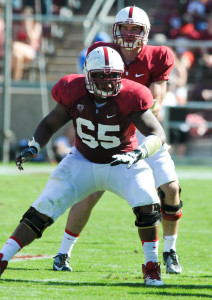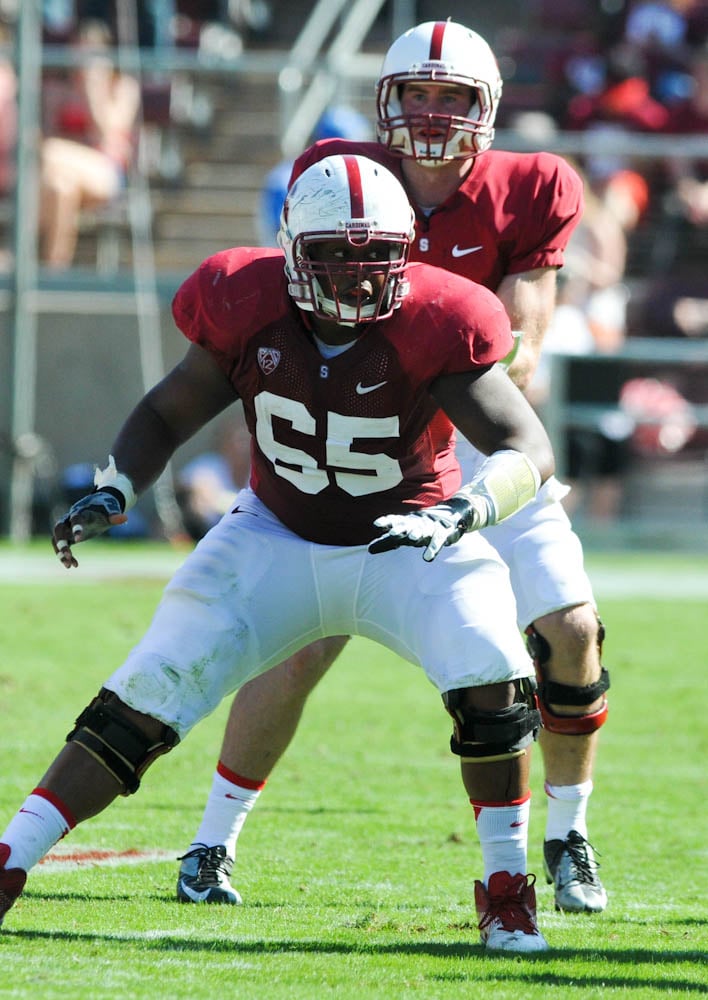If there’s one position group on the Stanford football team that prides itself on accomplishing its task as a nameless, faceless unit, it’s the Tunnel Workers Union.

But if you’re looking for some of the team’s most distinct personalities, that very same offensive line is a good place to start.
You’ve got seniors Cameron Fleming and Conor McFadden, for example, who have been featured for their uncanny intelligence in separate College GameDay segments in the last month alone. McFadden, the backup center, uses his photographic memory to break down opposing defenses; Fleming, the starting right tackle and an Aeronautics & Astronautics major, is literally a rocket scientist.
On the other hand, there’s fifth-year senior Kevin Danser. A biomechanical engineering major, he’s no slouch academically, but the starting right guard is known to blank out on the sideline every now and then. One coach sometimes compares Danser to his youngest child.
“He has some very freshman-like moments on the bench sometimes when we’re making adjustments, and he can be very forgetful,” said senior left guard David Yankey.
Another fifth-year senior who “embraces his inner child,” as McFadden put it, is starting center Khalil Wilkes. As if the terminology of the Cardinal’s complex playbook isn’t enough for most linemen to master, new players have to get used to Wilkes’ sayings as well.
“Khalil Wilkes has invented a new language that is used purely in the Stanford football locker room,” McFadden said. “I think it’s spreading across campus. It’s funny. I’ll go home, and ask my buddies to throw me ‘daps,’ and they’ll just kind of look at me funny, like, ‘What’s daps?’ And I’m just like, ‘Oh, you know, high fives. Don’t you guys talk?’”
Just as confusing is “ya boy,” a Wilkes-ian term that can refer to the speaker, a friend of the speaker or a friend of a friend — McFadden, intellect and all, isn’t really sure.
A close second to Wilkes as the team’s funniest offensive lineman is another center, junior Kevin Reihner. His jokes, however, take a slightly different form.
“We were calling him ‘The Gunman’ today,” Yankey said last week, “because he’s just always cracking jokes about people and trash-talking.”
“If you’re in a back-and-forth with [Reihner], you better be ready to roll,” McFadden cautioned. “We don’t really trash talk that much out on the field; we’re not out there making spectacular one-handed grabs or doing anything like that, so we don’t have that much material to work with. But just within the room itself and within the locker room, there’s a lot of back-and-forth between people, and Kevin Reihner is just on top of his game.”
If one offensive lineman does have material to work with, it’s Yankey, the offensive captain, 2012 consensus All-American and top prospect in the 2014 NFL Draft. Maybe that’s why he takes the trash-talking mantle from Reihner on game day.
“Every single time we’re playing against somebody,” Wilkes said, “[Yankey] is always chatting in somebody’s ear.”
That doesn’t necessarily make Yankey — who sports the endearing Twitter handle @papa_yank — the team’s “meanest” offensive lineman. Yankey bestows that title on the man who will likely replace him next season: 6-foot-5, 316-pound sophomore Josh Garnett, whose role as the team’s “Ogre” tight end is apparently befitting in more ways than one.
Garnett has seen more playing time than most other young members of the offensive line, but maturity permeates Stanford’s recent offensive line recruiting classes. Though McFadden, Wilkes and Yankey agreed that Danser was the senior who acted most like a freshman or sophomore, they named three different underclassmen who acted most like seniors: sophomore guard Johnny Caspers, sophomore tackle Nick Davidson and freshman tackle David Bright.
McFadden noted that sophomore tackle Kyle Murphy also acts older than his age — not like a senior, but like a grumpy senior citizen.
With that in mind, the future of Stanford’s offensive line is crystal clear. The names and faces of the Tunnel Workers Union will change every season, but the personalities aren’t going anywhere.
Contact Joseph Beyda at jbeyda ‘at’ stanford.edu.
